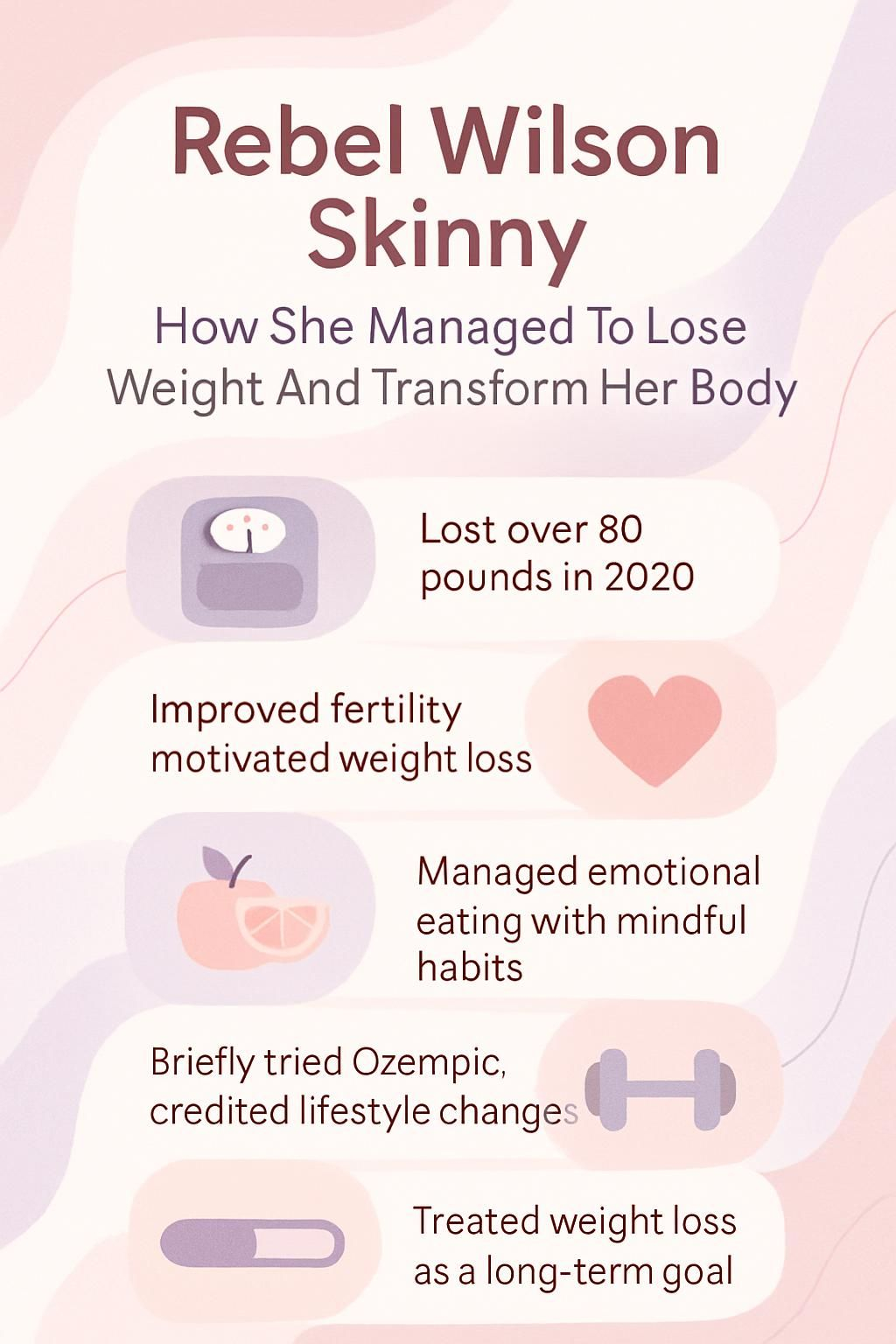Rebel Wilson Skinny: How She Managed To Lose Weight And Transform Her Body
Our Nutrition Assistant AI Suite will transform your body. You will lose fat, get toned, and build muscle. Gain confidence and optimal health.
If you have tried to lose weight and keep it off, Rebel Wilson’s story can help. The actor shared her “Year of Health,” a season where she focused on steady weight loss, stronger habits, and a healthier mindset. You will see how Rebel Wilson used simple moves, like walking more and eating higher protein, to support her weight loss journey without chasing a perfect number on the scale.
In this guide, you will learn the exact steps she used. Topics include emotional eating, a high-protein diet, daily activity, and how she balanced work, fitness, and mental health. Use what fits your life and start small. Progress counts.
Key Takeaways
- Rebel Wilson lost over 80 pounds during her “Year of Health” in 2020. She focused on a high-protein diet, daily walking, and cutting added sugar.
- Improving fertility was a major driver. A doctor explained that weight loss might help with egg retrieval for IVF in the setting of polycystic ovary syndrome, or PCOS.
- She addressed emotional eating with therapy, journaling, and mindful habits, not crash diets or severe restriction.
- Wilson tried Ozempic briefly, then stopped. She credited consistent nutrition and exercise for most of her results.
- Long-term success came from clear goals, self-care, flexible control of eating, and a marathon mindset, not a sprint (Medical Clinics of North America, 2019; Westenhoefer et al., Appetite 2013).

Rebel Wilson’s “Year of Health”

In 2020, Rebel Wilson named the year her “Year of Health.” She set public goals, tracked progress, and kept fans updated on Instagram. The theme was simple, steady steps add up.
Why was 2020 a turning point for Rebel Wilson?
After meeting with a fertility doctor in 2019, health moved to the top of her list. Early in 2020, she began changing daily routines, then built momentum as months passed. The pandemic slowed Hollywood, which gave her more time to cook, walk, and reflect.
During that season, she examined patterns, like emotional eating, and set long-term goals. The shift did not end in November 2020. It set the tone for how she approached food, movement, and mental health in the years that followed.
How did she set clear health goals?
Wilson picked specific, measurable targets. She chose a goal weight of 165 pounds, then tracked more than the scale. With coach Jono Castano, she monitored body fat, muscle mass, and weekly photos. This gave her a full picture of progress.
She began with a daily calorie target near 1,500, logged meals, and walked for about 60 minutes most days. Sleep, about eight hours per night, was part of the plan. These simple metrics kept her accountable and made success easier to repeat.
What motivated Rebel Wilson to lose weight?
Wilson has said her aim was better health, not a perfect image. She wanted more energy, improved fertility, and a lifestyle she could keep up while acting and writing.
How did improving fertility influence her?
A fertility specialist shared that weight loss might improve her chances with egg retrieval and future IVF. PCOS, a hormone condition that can affect ovulation, made the path harder. Taking control of her health felt like a concrete step she could make.
Wilson later welcomed her daughter Royce Lillian via surrogacy with Ramona Agruma in November 2022. The fertility goal gave her a strong reason to stick with the plan, especially on hard days.
“If I lost some excess weight, it would give me a better chance at freezing eggs and having a family… That’s what really motivated me,” Rebel shared in an interview.
With motivation set, she then worked on the emotional side of eating, which often blocks progress.
How did she overcome emotional eating?
Wilson has described periods when she ate around 3,000 calories per day, often sweets and refined carbs, to soothe stress. After her father died in 2013, that pattern grew stronger. The cycle was binge, then punishing workouts.
Therapy helped her break the loop. She used daily journaling, including “Purge Emotional Writing,” to process feelings before food. Mindful eating practices such as noticing hunger and stopping at satisfied, not stuffed, became nonnegotiable. These tools reduced binges and supported steady weight loss.
How did nutrition play a role in her weight loss?
Food changes gave Wilson a strong base. Energy improved, workouts felt easier, and late-night snacking dropped. The approach was flexible, not rigid.
What is a high-protein diet and how did she use it?
A high-protein diet means you eat more protein-rich foods, which help you stay full. Protein supports muscle repair after workouts too. Wilson ate foods like fish, chicken breast, and lean beef, and she used simple shakes with berries and unsweetened almond milk.
Research shows higher protein can reduce hunger and support weight management. Wilson said it helped control cravings and kept her energy steady. Treats were allowed in moderation, which made the plan easier to follow week after week.
Why did she cut back on sugar and processed foods?
Cutting added sugar and highly processed snacks made it easier to manage calories and avoid blood sugar spikes. Wilson often aimed for about 1,500 calories per day during her “Year of Health.” Fewer sugary foods meant fewer crashes in the afternoon and evening.
Processed items often pack hidden sugars and fats, which work against weight goals. Choosing whole foods, like vegetables, fruit, lean proteins, and legumes, supports appetite control and mood. I saw a similar change when I swapped candy for fruit during a work challenge. Fewer crashes, fewer cravings, better focus.
What fitness methods did Rebel Wilson follow?
Fitness was practical and consistent. She prioritized walking, then added strength and conditioning. The focus was to get fit, not to punish the body.
Why was walking her primary exercise?
Walking is simple, joint friendly, and easy to scale. Wilson’s routine often included 60 minutes a day, six days per week, with one rest day. That rhythm helped her stay active even during busy filming or travel.
Steady walking burns calories and lowers stress. Many people find it easier to keep for months compared with high-impact options. Once the habit feels automatic, you can layer on other training.
How did she incorporate strength training and other workouts?
- Structured weeks were common, sometimes up to 7 sessions, adjusted for recovery and schedule.
- Each session often included about 1 hour of strength work to build muscle and raise metabolism.
- Another hour might focus on cardio intervals, stair sprints, or ropes to increase calorie burn.
- Variety mattered. Circuits, boxing, and intervals kept training fresh and reduced boredom.
- Coaching from a trainer, like Jono Castano, helped her progress safely and stay accountable.
- Short challenges, such as a 6-week health challenge, provided mini-deadlines and quick wins.
- Consistency, not perfection, drove results. Sleep, stress, and recovery were part of the plan.
- Simple rule of thumb, show up often, track basics, and adjust when life gets hectic.
How did Rebel Wilson focus on mental and emotional wellness?
Changing the body is not only physical, it is also mental. Wilson worked on self-talk, body image, and stress, which helped her stick with the plan.
How did she overcome self-esteem struggles?
For years, Wilson was cast as the “funny fat girl,” including roles like Fat Amy in Pitch Perfect. That pressure clashed with her health goals. She has said, “I think a lot of the time I was emotional eating.”
In a January 2024 Instagram post, she shared raw thoughts about self-worth, size, and public labels. Gratitude became a daily practice. She listed “five things” she was grateful for, which lifted her mood and reduced all-or-nothing thinking. Working on confidence was as important as any workout.
What self-care routines did she adopt?
- Soothing baths with Epsom salts to relax sore muscles after training.
- Eight hours of sleep to restore energy, support hormones, and improve focus.
- Positive self-talk, short affirmations said daily to build confidence.
- Gratitude journaling and emotional writing to process stress without food.
- Meditation or quiet time to lower anxiety and reset before bed.
- Mindful indulgences, like a burger or dessert on occasion, without guilt.
- Self-care first, then food choices. That order reduced emotional eating over time.
- Regular sleep and stress management, which are linked to a healthier weight.
What myths exist about Rebel Wilson’s weight loss?
Rumors often miss the real work. Wilson has clarified what she did and did not do so you can focus on what actually helps.
What is the truth about the Mayr Method rumors?
Wilson denied using the Mayr Method. She also said she did not rely on diet pills or quick fixes. Her approach centered on higher protein, fewer added sugars and processed foods, and lots of walking.
Social media often credits diets or drugs for dramatic weight drops. Wilson’s message was different. She pointed to habits repeated over time, not a secret plan.
Did Rebel Wilson use Ozempic and what are the misconceptions?
In March 2024, Wilson shared that she tried Ozempic, a prescription drug for diabetes that some people use off-label for weight loss. She said it helped cravings for sweets, but she does not use it now. The bulk of her results came from nutrition and movement.
Many assume celebrities lose weight only with medication. Wilson’s journey shows otherwise. Lifestyle changes, backed by support from professionals, did most of the work. Medication can be helpful for some people, under medical care. It is not a stand-alone solution.
What lifestyle changes helped her maintain long-term results?
After the “Year of Health,” Wilson kept the basics in place. Balanced meals, daily movement, and mindset tools shaped her routine and helped her maintain progress.
How did she find balance with indulgences?
She did not give up favorite foods. Instead, she practiced moderation. If a vacation led to extra treats, she returned to her habits at home without shame. That flexible approach lowers rebound eating and makes maintenance realistic.
Allowing small indulgences can support long-term success. Study findings suggest rigid rules often backfire, leading to overeating^1^.
Letting go of all-or-nothing thinking creates room for body positivity and steady progress, even while you enjoy a dessert or a burger now and then.
^1^: Westenhoefer J et al., Appetite 2013; “Flexible vs rigid control of eating behavior: relationship with BMI in obesity.”
How did she stay consistent with healthy habits?
Wilson tracked data in simple ways, such as photos, weight, and body composition. Sharing honest updates on Instagram kept her accountable through good weeks and tough ones. Gratitude and short journal entries helped her reset when cravings hit.
Her coach emphasized that sustainable change takes time. She treated weight loss like a long project and accepted setbacks as part of the process. That mindset made it easier to keep going, not quit.
How did Rebel Wilson’s transformation impact her life?
Improved health brought new energy and new chances at work. It also changed how others saw her, for better and sometimes for worse.
How did it redefine her acting career?
After her weight loss, casting started to shift. She took on roles such as Lady Capulet in “Juliet & Romeo” and appeared in “The Almond and the Seahorse.” The move away from constant comedy roles allowed her to show range.
Media attention often focused on her body more than her craft, which can be frustrating. Still, healthier habits supported long days on set and focus while writing her memoir, Rebel Rising. Choosing health first changed the story she could tell.
How did people treat her differently after losing weight?
Public reactions changed. Strangers complimented her more. Some industry voices who once boxed her into a single type began to view her differently.
Close friends showed more interest in her habits too. Visible results often spark questions. That attention can feel odd, yet it can also reinforce new routines when handled with care.
What lessons can be learned from Rebel Wilson’s weight loss journey?
Wilson’s path highlights progress over perfection. You can borrow the parts that fit your life and leave the rest.
Why is embracing imperfection important?
Perfectionism often leads to quitting. Accepting an imperfect day keeps you in the game. If you enjoy dessert or miss a workout, get back to your routine at the next meal or the next morning. That single choice keeps momentum alive.
People who forgive slip-ups tend to do better long term. This mindset is useful for emotional eating and for unlearning harmful body standards. Health matters more than size alone.
Why should weight loss be viewed as a marathon, not a sprint?
Fast fixes rarely last. A review in Medical Clinics of North America notes that many people regain weight within five years. Slow and steady helps protect mood, metabolism, and habits.
A balanced plan, such as a Mediterranean-style approach, and a goal of one to two pounds per week is realistic for many adults. Small wins add up. In my case, shorter walks after dinner led to more energy, then I felt ready to add strength work two months later.
Think long term. Treat yourself with care as you build routines you can keep.
Conclusion
Rebel Wilson’s “Year of Health” shows how you can lose weight with simple tools. Pick clear goals, focus on protein and whole foods, walk most days, and work on the mental side. Be honest about setbacks. If medication enters the plan, that choice belongs with you and your clinician.
Health first, looks second. If you want lasting change, start with small steps you can repeat. This article is educational and does not replace medical advice. Talk with a licensed healthcare professional about your own plan.
Progress happens step by step, not overnight.
FAQs
1. How did Rebel Wilson lose weight and transform her body?
Rebel Wilson focused on her healthy lifestyle by changing what she used to eat, reducing carbohydrate intake, and addressing emotional eating. She worked really hard to untangle herself from being typecast by losing weight.
2. Did Rebel Wilson’s health conditions affect her weight loss journey?
Yes, Rebel Wilson has polycystic ovarian syndrome. This condition can make weight loss more difficult, but she managed her health by thinking of her own needs and staying committed to her goals.
3. What role did emotions play in Rebel Wilson’s eating habits?
Rebel Wilson has said she used to eat when she felt bad or lost focus on her healthy habits. She realized emotional eating made her feel bad and worked to change that pattern.
4. Did Rebel Wilson’s career influence her decision to lose weight?
Rebel Wilson wanted to untangle herself from being typecast in roles like in Funny Girl. She aimed to lose weight to get new movies and write her memoir, showing her transformation was both personal and professional.
5. What advice does Rebel Wilson give about weight loss?
Rebel Wilson shares that it is important to focus on your healthy lifestyle and think of your own needs. She believes working really hard has meant positive changes, and she encourages others not to lose focus on their goals.







